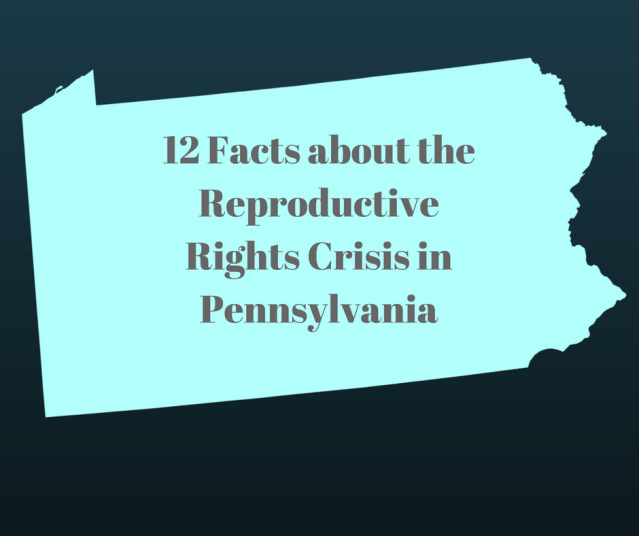
On Wednesday July 19, Lady Parts Justice League will bring a comedy-and-activism themed road trip they’re calling the Vagical Mystery Tour to Pittsburgh, and the Women’s Law Project is pleased to be a part of the talkback section of the show. (Get tickets!)
Why is the LPJ League stopping in Pennsylvania? Pennsylvania, which ranks 49th in female representation in the state Legislature, is extremely hostile to reproductive health and rights. “I think a lot of people don’t realize that Pennsylvania is a hotbed of [anti-]abortion extremism,” Winstead recently told the Pittsburgh CityPaper.
Did you know that Pennsylvania is a hotbed of anti-abortion extremism? Here are twelve facts you should know about attacks on reproductive rights & health in Pennsylvania.
1
Pennsylvania is one of the most restrictive states in the country when it comes to abortion access. Currently, 1,237 pages of laws, statutes and regulations related to abortion are on the books, despite legal abortion being a safe procedure with very low complication rates.
2
Pennsylvania is currently considering the most severe abortion restriction in the country. Senate Bill 3, sponsored by Sen. Brooks, contains two restrictions in one bill: it criminalizes all abortion after 19 weeks, and also contains a “method ban” provision. The bill uses non-medical terminology, but it seems to seek to criminalize the use of a procedure known as dilation and evacuation (D&E), despite the fact D&E is a commonly used, medically tested, safe procedure.
3
Radical right-wing Pennsylvania lawmakers are pushing the Trump agenda by targeting Planned Parenthood patients via Senate Bill 300. SB300 is a misleadingly written bill that would ban subsidies for preventative reproductive healthcare such as contraception for Pennsylvanians who rely on Planned Parenthood—whether by preference, or because they have no other choice due to a lack of other options.
4
In 2013, the Pennsylvania Legislature passed a law that prohibits women from purchasing private health insurance coverage through the state exchanges—in other words, through the Affordable Care Act—that covers pregnancy termination. The Pennsylvania Legislature debated, then explicitly denied, an exception for the health of the pregnant woman.
5
In 2011, the Pennsylvania Legislature passed a controversial law mandating that freestanding abortion facilities adhere to architectural and personnel regulations established for ambulatory surgical facilities, despite opposition from all relevant medical associations. It is similar to a provision knocked down by the Supreme Court last year in the Whole Woman’s Health v. Hellerstedt.
6
In 2012, Pennsylvania proposed one of the most invasive transvaginal ultrasound laws in the country. The proposed law would have not only required women seeking abortions to undergo mandatory transvaginal ultrasounds, but doctors would have had to document whether or not their patient looked at the screen during the procedure.
7
Medicaid does not cover abortion. Public funding is available for abortion only in cases of life endangerment, rape or incest.
8
Though we enforce a Medicaid ban and prohibit families from purchasing private insurance through the exchange to cover pregnancy termination even when the health of the pregnant woman is at stake, Pennsylvania annually funnels millions of taxpayer dollars into so-called “crisis pregnancy centers.”
9
82% of Pennsylvania counties have no abortion providers.
10
Anti-abortion radicals, with support of a multi-million dollar right-wing Christian legal group called the Alliance Defending Freedom, are attacking the buffer zone in Pittsburgh with the goal of enabling sidewalk protesters to move physically closer to patients and staff.
11
Another evangelical legal group called Liberty Counsel, which has been designated a hate group by the Southern Poverty Law Center, is attacking the buffer zone in Harrisburg.
12
A panel of experts recently determined that 24% of statements in Pennsylvania’s “informed consent” booklet, given to women considering abortion, are scientifically inaccurate or misleading.
Want to help fight back? You can start by signing up for our Action Alerts, and review this list of good and bad legislation currently under consideration in Pennsylvania.
The Women’s Law Project is the only public interest law center in Pennsylvania devoted to advancing the rights of women and girls.
Sign up for WLP’s Action Alerts here. Stay up to date on issues and policy by subscribing to our blog, following us on twitter and liking us on Facebook.
We are a non-profit organization. Please consider supporting equal rights for women and girls by making a one-time donation or scheduling a monthly contribution.

